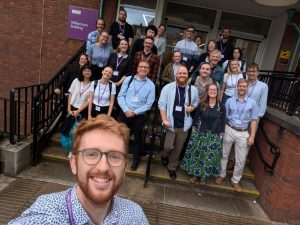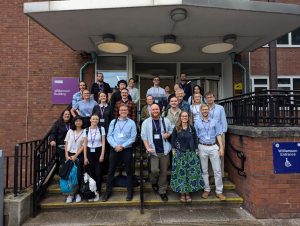Environmental Mineralogy Group and the Royal Society of Chemistry’s Radiochemistry Group ‘Research in Progress Meeting: Environmental Contaminant Mobility: Mineralogy & Radiochemistry‘
15–16 July 2024, University of Manchester
MEETING REPORT
Organising Committee: Luke Townsend (EMG Chair), Thomas Neill (EMG Treasurer), Aislinn Boylan (EMG Industry Rep), Louise Natrajan (RSC Radiochemistry Chair), Liam Abrahamsen-Mills (RSC Radiochemistry Committee Member)
Support: Nuclear Waste Services and Dalton Nuclear Institute
Sponsorship: National Nuclear Laboratory
The EMG-RSC Radiochemistry Joint Research in Progress (RiP) Meeting aimed to provide a platform for researchers at all stages of their career to have an open and friendly platform to present their work regardless of its stage of completion. To this end, the meeting was a great success, bringing together researchers from a wide variety of UK institutions and career stages for a valuable two half day meeting where themes that were covered included (but were not limited to) radioactive and non-radioactive contaminated land, geological disposal of radioactive waste, and mining. The keynote talk was delivered by Prof Claire Corkhill (University of Bristol) whose engaging and interesting work intersected the two themes of environmental mineralogy and radiochemistry expertly well; drawing on how naturally occurring minerals can help to inform disposal of radioactive waste.
As the meeting was held jointly with the RSC Radiochemistry group, there was the opportunity for EMG members to explore new areas of science that they may not usually be exposed to, including advanced spectroscopic analytical techniques and modelling. This was also true for members of the RSC Radiochemistry group who were attending and as such, good, insightful discussions were had between all attendees. These positive interactions were not just limited to the presentation sessions as the optional meal was well attended and this provided an invaluable opportunity for researchers to network with their peers in a more relaxed setting.
Due to some last-minute changes of schedules, some attendees had to join the meeting online, including the opening presentation of the conference. However, thanks to the hard work of the University of Manchester volunteers, the setup worked seamlessly. Over the remainder of the meeting, a consistent group of attendees joined the talks online and seemingly found the experience beneficial (from their closing remarks over the Teams meeting).
Thanks to the financial support from various parties, the meeting remained free for all attendees. Lunches, coffee, and snacks were provided throughout, and two prizes were awarded to Jana-Sophie Applet (Best Student Talk) and Garry Manifold (Best Student Poster).
Future meetings should focus on expanding the EMG’s membership base with an aim to increase attendance at these meetings. As a joint RiP, the meeting attracted approximately 30 – 40 attendees, which whilst good for a small meeting, could have been better given the scope of the meeting and the reach of the two membership bases.


A quick group photo before heading off to the meal at the close of day one (some attendees had unfortunately already left for the day).
Programme
- The SURRI project: Developing new technologies for Sustainable Remediation of Radionuclide Impacts on Land and Critical Materials Recovery at legacy uranium production sites
Frances Burrell (University of Southampton)
- Fate and Behaviour of Trace Metals, PAHs and Hormones in Estuarine Sediments: An example from Southampton Water, UK
Jana-Sophie Appelt (University of Southampton)
- CO2 and O2 flux assessment in mine waste and the potential for implementation of field trials at a mine site in Northern Europe: Why it matters and how novel methodologies can determine the balance between CO2 sequestration / emissions
Logan Clancy (Cardiff University / Mine Environment Management)
- Mineralogical transformations in materials designed for plutonium immobilisation
Claire Corkhill (University of Bristol)
- The speciation of oxyanion-forming metal(loid)s (As, V, Cr, Se, Mo, and Sb) in freshwater lake sediments
Mirsya Mulyani (University of Leeds)
- Application of Electrokinetic Remediation for the in situ Clean-up of Medium- and Long-Lived Radionuclides in Sediments
Shaun Hemming (University of Southampton)
- NWS RSO Radiochemistry Discipline Lead Talk
Andy Cundy (University of Southampton)
- Spatially Resolved HERFD Spectroscopy at the Uranium M4 Edge: A novel characterisation of Uranium Speciation in natural mineral analogues
Aidan Friskney (University of Sheffield)
- Further Development of a Sustainable Active Treatment System for Circum-neutral Mine Water with Precipitation and Sorption Mechanisms
Victoria Smyth (University of Exeter)
- Probing actinide electronic structure and bonding with Resonant Inelastic X-ray Scattering
Nathan Alcock (University of Manchester)
- Understanding the fate of Tc(IV) and U(IV) upon air exposure
Chris Foster (National Nuclear Laboratory)
- Arsenic Adsorption onto Iron-Manganese Binary Oxides Controlled by Biofilm Produced by Pseudomonas putida
Sharmin Yousuf Rikta (University of Oxford)
- The mineralogy of altered nuclear waste glass
Clare Thorpe (University of Sheffield)
- Developing Uranium L3 and M4,5 edge HERFD-XANES and RIXS to investigate uranium biogeochemical processes
Charlie Waters (University of Manchester)
- Uranium speciation in magnesium potassium phosphate cement (MKPC) leachates
Raphael Margreiter (University of Manchester)
Poster Presentations
- Progress Towards the Immobilisation of the UK Plutonium Inventory in Titanate Ceramics
Lewis Blackburn (University of Sheffield)
- Environmental Radiochemistry Research within the Nuclear Waste Services Research Support Office (NWSRSO)
Will Bower (Nuclear Waste Services)
- The impact of sulphate and salinity on microbial communities in alkaline conditions relevant to nuclear waste disposal
Kirsty Davies (University of Huddersfield)
- Performance of Fe-modified Biochar and Carbo-Iron in Remediating Arsenic in Groundwater
Mingyu Feng (University of Manchester)
- Interactions Between H2O2 and Ceramic Materials for Actinide Immobilisation to Simulate Radiogenic Oxidant Behaviour
Latham Haigh (University of Sheffield)
- Synthesis and characterisation of Th(IV)-doped nano-U(IV)
Evie Howard (University of Manchester)
- Alteration of vitrified radioactive waste in a low temperature natural environment
Gary Manifold (University of Sheffield)
- Investigating the Organic and Environmental Controls on Elemental Sulfur Formation
Shuo Wang (University of Oxford)
- Recent Developments in the National Nuclear User Facility in the Centre for Radiochemistry Research
Ashley Wooles (University of Manchester)